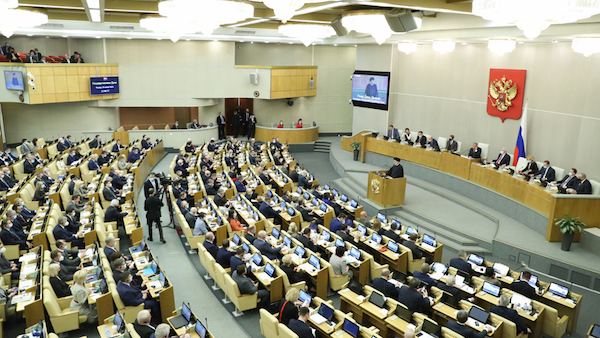
Iranian President Ebrahim Raeisi addresses the State Duma of Russia in Moscow on January 20, 2022. (Photo by president.ir)
Addressing a meeting of Russia’s State Duma, Iranian President Ebrahim Raeisi says the United States is in the weakest position it has ever been, and that its "strategy of domination" is in disarray thanks to the "resistance" of independent nations such as Iran and Russia.
"The strategy of domination has now failed, and the United States is in its weakest position, and the power of independent nations is experiencing its historic growth," Raeisi said while addressing the State Duma of Russia in Moscow on Thursday.
"The important thing in this age, which requires vigilance, is that the desires for domination have not disappeared and new forms of domination are on the agenda," he added.
He said the new forms of domination are meant to weaken independent countries, particularly through economic sanctions, and promote instability and insecurity. "In such a way that they try to change the place of the oppressor and the oppressed in public opinion."
The president added that an international system based on domination has yielded no result but war, violence, insecurity, and division among nations.
The "evil alliance" of the United States with terrorists is clear to the world, especially to the nations of West Asia, from Syria to Afghanistan, Raeisi said.
He warned of complex plots aimed at sending Takfiri terrorists on "new missions from the Caucasus to Central Asia," adding, "Experience has shown that it is pure Islamic thought that can prevent the formation of extremism and Takfiri terrorism."
The Iranian president emphasized that the resistance of nations is the main cause of the failure of the policy of military occupation and the United States’ escape from Iraq and Afghanistan.
"The idea of resistance serves the independence of countries. In modern times, the concept of resistance plays a central role in deterrence equations," he stated.
Raeisi said Iran is determined to promote "maximum interaction" with all countries around the world, especially its neighbors and allies.
"The purpose and basis of this cooperation and interaction is the mutual interests of nations and the increasing formation of a ‘civilized global community," he added, noting that such a goal can be achieved through cooperation among "independent countries with high cultures and attention to the principles of justice, morality and spirituality."
He said Iran’s policy of maximum interactions with independent states are "original and will continue regardless of the developments in the international environment."
Reiterating Iran’s will and readiness to expand relations with Russia, Raeisi said there are very clear horizons for cooperation between Tehran and Moscow at bilateral, regional and international levels.
"Strengthening Iran-Russia relations in bilateral and multilateral forms will boost the economies of the two nations and strengthen regional and international security," the Iranian president added,
He said the economic and trade capacities of Iran and Russia along with their power and influence in the geographical areas can strengthen the convergence between the regions.
He added that Iran and Russia have had a "successful" model of cooperation in Syria which has also "ensured the independence of the countries and the consolidation of regional security in the continuation of the resistance of the Syrian people and government."
Elsewhere in his address, Raeisi said imposing sanctions on nations is a common form of new domination, stressing the importance of cooperation among independent states and a collective response to counter such a policy.
"Otherwise, sanctions will affect all countries, even US allies, under various pretexts," he added.
He noted that the United States claimed that it has imposed sanctions on Iran over the Islamic Republic’s nuclear activities, although it is clear to all that Tehran’s nuclear program is legal and under the constant supervision of the International Atomic Energy Agency (IAEA).
"But the reality is that in different historical periods of Iran’s development, whenever our nation has raised the banner of nationalism, independence, or scientific development, it has faced sanctions and pressures of the Iranian nation’s enemies," Raeisi said.
In accordance with the fatwa of Leader of the Islamic Revolution Ayatollah Seyyed Ali Khamenei, Iran does not look for a nuclear weapon, he added, emphasizing, "Such weapons have no place in our defense strategy."
The chief executive warned that the US seeks to oppose the Iranian nation’s rights, saying, "Our philosophy is also clear: ‘We do not relinquish the rights of our nation.’"
"We are not satisfied with anything less than our rights. The Islamic Republic of Iran is serious about reaching an agreement if the other parties are serious about lifting the sanctions effectively and operationally," Raeisi said.
Iran, Raeisi said, is the winner of two battlefields; one against terrorism and the other against the American campaign of maximum economic pressure.
The president said the country has "extensive economic potential, especially in the fields of energy, trade, agriculture, industry and technology, which pave the way for beneficial cooperation for any bilateral or multilateral interaction with different countries."
He noted that basic agreements which have been signed between Tehran and Moscow would set the stage for a significant leap in bilateral economic relations, serve both nations’ interests and promote peace and stability of nations in different regions.
"The privileged geographical location of Iran, especially the north-south corridor, can make trade from India to Russia and Europe less expensive and more prosperous," he said.
LINK: https://www.ansarpress.com/english/26315
TAGS:






























 online news tv
online news tv




